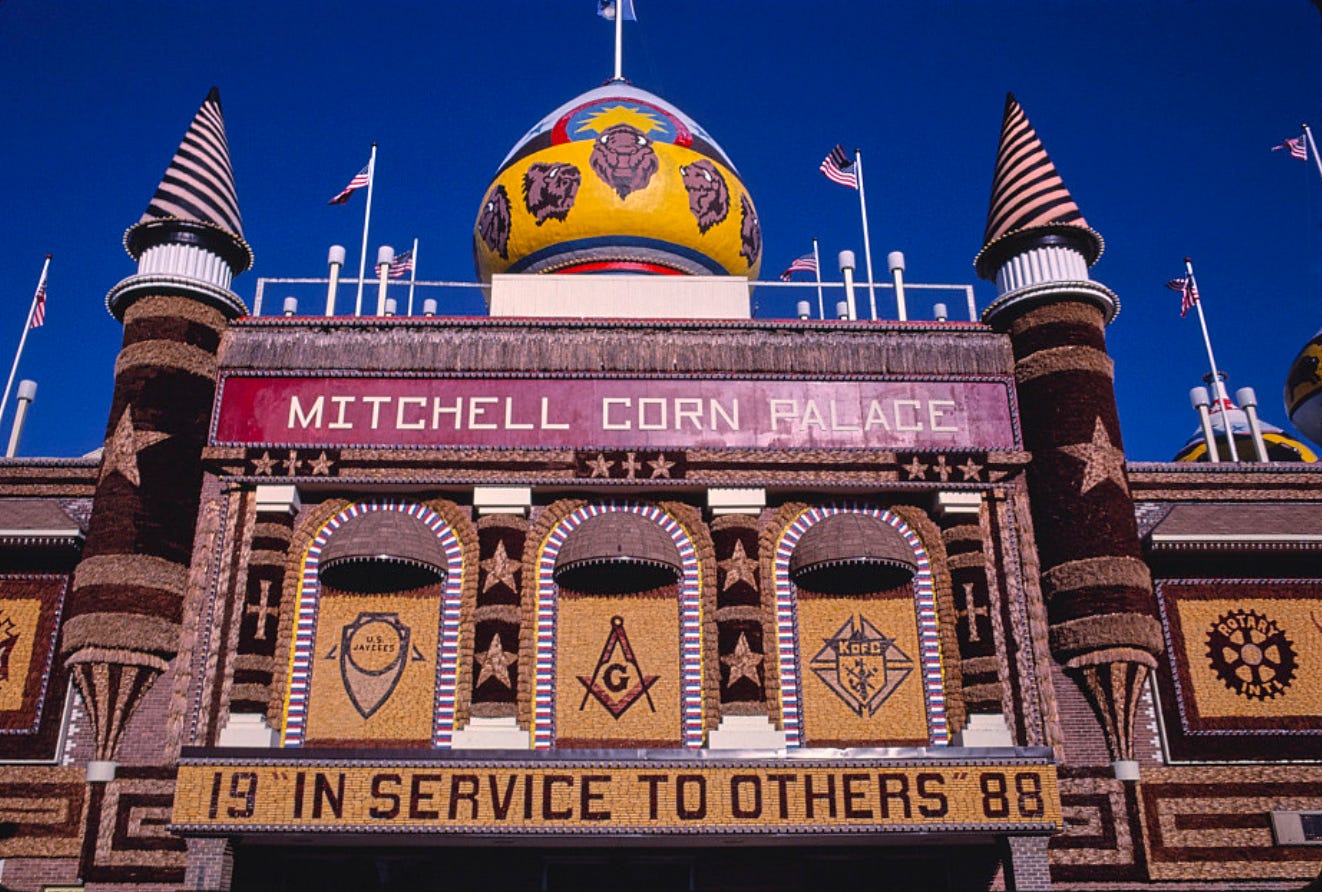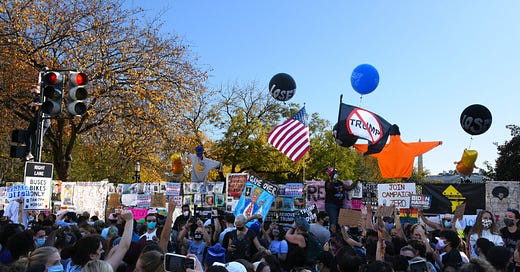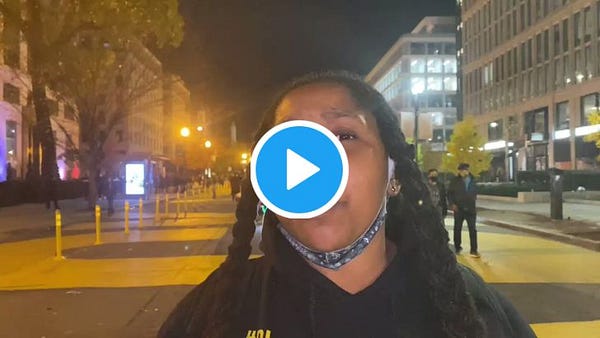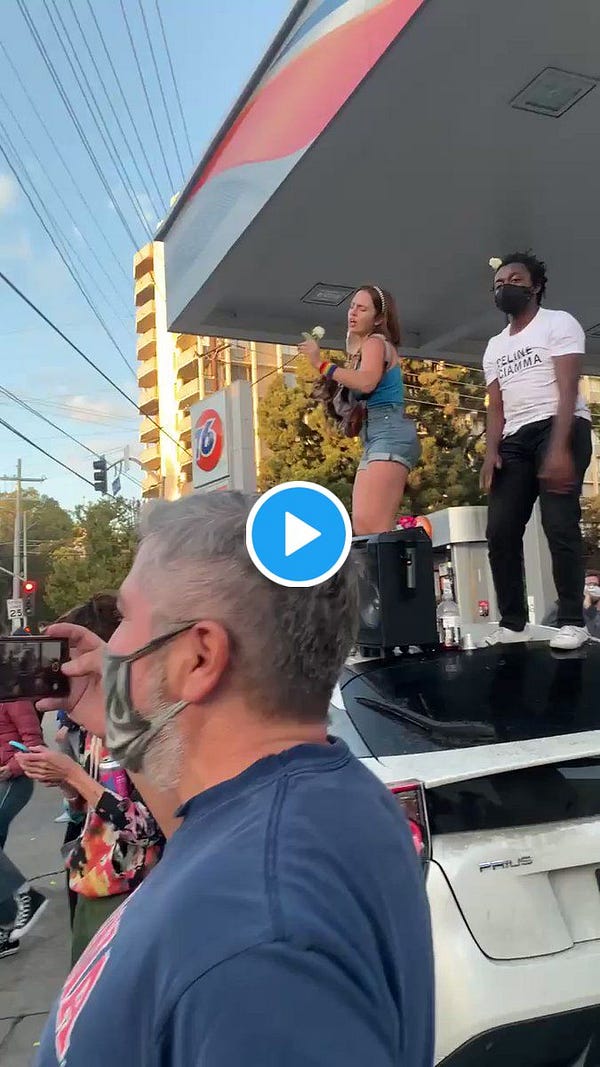We can make each other care
There's nothing inevitable about 72 million Trump voters, but it will take a different type of conversation
The election is over and there was dancing in the streets and fireworks over a Delaware parking lot. At least for now, the forces of potential fascism have been too busy stepping on various rakes to emerge as forces of full realized fascism. There was champagne and elation and a beloved hockey-adjacent nightmare monster and the world’s most perfect break-up song played at full volume from the roof of a Prius. Somehow every corner of the country was simultaneously enjoying the same perfect weather. It wasn’t too hot or too cold. It was just lovely.
There is a difference, however, between unbridled joy and the frenzied release of pent-up anxiety. Under the paving stones, a beach… but underneath that, more paving stones. We weren’t celebrating a bold step in the march towards justice as much as we were relieved that we had run away before the car exploded.
The specter that hangs over this, of course, is 72 million votes cast (not solely but disproportionally by white people) for our hating-people-and-letting-them die President. Those votes aren’t the only indication of a white people problem, but they sure don’t help. Last week I wrote about the urgent need for a particular variety of anti-racist organizing in white communities (Rep. Alexandria Ocasio-Cortez made the same argument much more succinctly). What follows is a corollary- a framework for those conversations. It isn’t a script, nor a one-size-fits-all conversation guide. If you’re reading this and would like to go deeper, I’ve got some opportunities posted over at The Barnraisers Project. I’d love to hear from you.

First, though, an acknowledgment. Yes, it’s maddening that white people have to be compelled to choose collective dignity over individual fear. For Black, Indigenous, Latin, Asian and Arab folks, the fact that their humanity is up for debate is insulting and dangerous and tiring and amoral. It makes all the sense in the world, in the face of it, to say “to hell with white people… just organize in communities of color.”
But as would-be anti-racist white people, we don’t accomplish anything by smugly asserting our anger and outrage. It is our communities that are morally broken, after all. And, as much as it would be rhetorically satisfying to join in the “to hell with white people” call, the math remains that there is no way to produce transformative social change without us taking responsibility for our corners of the country.
So, for better or for worse, there’s a need for a case to be made. Here’s a framework for how to do so. It starts with a theory of why we’re here (and where “here” is, exactly).
Every social justice issue barrels down to a choice between self-centered vs. community-centered thinking: You may have noticed a consistent refrain this cycle whenever Trump supporters were asked to justify their vote. You were much less likely to hear “I want Black people and Mexicans to stay in their place” than something to the effect of “my IRA or 401k is doing great right now!” And though most outward justifications for unpopular opinion are at least 60% smoke screen and diversion, it actually doesn’t matter. In both cases, the core message is the same: “I am aware that others are hurt by my support for this candidate, but it doesn’t matter because I’m getting something out of the deal!” This is no different from the reasons why corporations avoid paying taxes and livable wages or why white progressive parents routinely decamp for segregated suburban, magnet or private schools. In every case, it’s not that we’re unaware that our choices have a downstream impact. We’re all just following the broader cultural logic of looking out solely for ourselves and a tiny circle immediately around us.
Selfishness isn’t actually human nature, but it IS how we’ve been socialized: Human beings’ brains are wired for cooperation and community care. We’re at the end of a devastatingly efficient information funnel, however, one started thousands of years ago with the birth first of patriarchy and then anti-Black and anti-Indigenous racism and then further honed through centuries of empire, capitalism, conquest and colonization. Its job has been to instill in us the myth that not every human being is deserving of equal care and therefore that it is justifiable to merely look out for yourself and your immediate family. This addiction to individualism isn’t unique to white people (nor to men) but it is most deeply internalized by those of us whose power this system was built to protect. It is tragic that we’re so bad at choosing a different path, but given the centuries of investment in getting us to this point, it’s not at all surprising.
Turning towards community is hard because it’s not just about caring for others, it’s about divorcing yourself from the story about yourself you’ve worked so hard to craft: How do we (and here I’m talking Americans, especially white Americans) judge a well-lived life? Through the amassment of “successes”— professional milestones, property ownership, our kids’ performance compared to other kids, etc. And though the particular milestones involved manifest differently along class lines, the cultural logic of individualism is the constant. This means that when we’re asked to consider changing our beliefs or behavior for the common good, we’re wrestling not merely with the material impact of that decision, but the way it might damage the story we’ve been telling ourselves. For some, it is a stubborn opposition to government welfare programs because of their personal pride in “not accepting hand-outs.” For others, it is a fear of any educational policy changes that might jeopardize their daughter’s glide path to the Ivy League (and therefore rob them of the implicit validation of their parenting ability that acceptance would provide). We all have our own version of these individualistic hero stories, which is bad news for our cognitive dissonance but very good news for our ability to make empathetic organizing connections with one another.
The second half of the equation is the invitation.
We actually DO desire something more out of our shared life: I often start organizing conversations by asking the other person what they’d like their legacy to be, what they would want their children, their neighbors and their colleagues to say about them when they pass. I then ask about their dreams for the community in which they live. Not surprisingly, it doesn’t take much care and watering before empathy and love sprouts to the top. This doesn’t mean that merely asking somebody to dream like this will cause them to support reparations, but it allows you to change the question from “why don’t you believe this correct thing that I believe?” to “so how do we build the world of your aspirations?” Organizing isn’t yelling across a canyon asking people to join us, it’s helping them imagine how beautiful the other side must be and then figuring out how to build the bridge together.
Individualism is exhausting and tenuous and nobody actually likes it: The bad news is that the cultural logic that got us here is deeply entrenched. The good news is that it’s very clearly made all of us miserable (if you haven’t read Anne Helen Petersen’s new book Can’t Even, please do- it tells this collective story so masterfully). We’ve been sold the line that crawling over one another to make a good life will be fulfilling. Our collective stress and anxiety tells a different story.
Back to the Trump voters’ IRA brag: what reasonable person would actually choose a world where they have to skrimp and save and then still have to put their faith in the whims of a market in order to retire? What parent would volunteer to pour untold amounts of money/time/stress trying to jerry-rig an education system to serve their kids rather than just being able to trust that every single school is a loving and wonderful place? What family wants to live in a neighborhood propped up by bloated police budgets and restrictive zoning, one that lives in constant unfounded fear of people and neighborhoods who are still waiting for a long-overdue reparational debt to be paid? If you rolled your eyes at the “what do you want your legacy to be?” questions I posed above, don’t fret— it is equally productive to get folks imagining by prompting them to reflect on everything that’s awful, exhausting, isolating, scary and stressful about our shared daily life.
Life will be so much better and so much easier for all of us in a world shaped by reparations, collective dignity and community care: Just to be very clear: When a system is rigged, there won’t be any unrigging without both material and spiritual change on the part of those that it has traditionally benefited. Building a robust, reparations-minded social safety net will necessiate just about everybody chipping in more for taxes, not just the super-wealthy. Support for truly universal social programs will require working-class whites to cleave themselves from the toxic myth that they remain a class apart from undeserving Black people (it’s always worth noting, of course, that this myth was never organic, but was a gentry-led strategy to nip emerging cross-class solidarity in the bud). Any fundamental transformation of the American education system will require privileged white parents to give up hyper-competitive, achievement-oriented parenting paradigms.
Even necessary change is hard. It involves loss and grief and yes, “fragility.” A good organizer is a good coach— willing to probe those fears and anxieties, not in order to coddle them, but to help people they love and are in relationship with move past them. And the way you do so isn’t merely appealing to empathy (though that is a huge piece of it) but helping all of us reconnect to the life we actually want to live. We would much rather share a country where nobody had to worry much at all about their safety or security, let alone their medical or student loan debt or their houses’ resale value or their neighborhood school’s letter grade score. That’s what we’re building towards. That’s the welcome mat we’re laying out.
You’d be forgiven for reading that and wondering “well, that seems so lofty so as to only appeal to wild optimists or doctrinaire Marxists— it’ll turn off regular folks.” And to be fair- my dreams are pretty specific to me. The point of all this isn’t to get another person to share every single one of my specific policy preferences, it’s about the possibilities opened up by the conversation when it becomes not about the constraints of our political reality but about what each of us would build if the goal was to care for everybody.
We often assume that winning white people to the cause of racial and social justice is about getting them to accept a specific fact base about privilege and structural oppression and microaggression. That’s why “conversations about race” with white people devolve into low rent Lincoln Douglas debates. I’ve discovered time and time again, though, that the biggest barrier to a white person being able to come around to anti-oppression politics isn’t their fluidity with anti-racist vocabulary, but their relationship to individualism (goodness knows there are plenty of folks who have mastered the vocabulary but are still causing a whole pile of pain). Once somebody is ready to say“I care more about the health of this community as a whole than my individual place in that narrative,” there will still be tons of learning and growth ahead, but you’re at least ready to walk that road together.There was joy in the streets on Saturday not because the revelers have been dreaming of a Joe Biden administration their entire lives. People cried and shouted because we have been so frightened, justifiably so, that our country was resigned to only make the cruelest, selfish choices. It felt amazing to at least dream about a future where we’d make better ones.
As long as white people in this country stand in the way of progress, I’m going to spend the rest of my life inviting every one of them to make the radical choice to commit to community. We often talk about those as “difficult conversations” but that couldn’t be farther from the truth: They are conversations that require the other person to make a change, of course, but that also welcome them into a new experience of caring for and being cared for by others. And damn if there’s not so much joy in that.
Let’s dance.









One thing I'm learning in these past couple of months is how much my closest ones (who are white, yep, and I'm talking specifically about those who are not already committed to justice and equity) just *don't want to talk about it.*
Talking about what we want from our shared future, talking about policy, talking about leadership, have always felt important to me. But as I've become more informed and impassioned, especially in this last year, the closest ones I'm referring to have actively backed away. They stay present for conversations on the phone, but change the subject very quickly. They ignore almost all written invitations.
I am doing my best to stay invitational, leave space for them to talk, ask open questions. (I fail sometimes.) I keep most of my communication non-political (cat pics! the usual fun or necessary texts!) but I know they feel baffled and sometimes annoyed by the fact that I *ever* bring up social and community issues, and ask them to engage. It's shifting the tenor of these relationships.
I feel...mostly I feel disappointed. In them. In my inability to live up to my own ideals (see above.) In the fact that these relationships, which are important to me, apparently have to change. Sometimes I imagine what it would be like to give in, go back to thinking that if we don't talk about social and political issues, then they don't affect us. And to thinking that just thinking about ourselves is enough. I don't miss those days at all, not truly. Not knowing how much damage they did to all of us. I guess I'm saying I understand why so many white folks do miss that, and why they choose to look away again now.
I'll keep trying. Another thing I'm learning is how much time—unpredictable, unmeasurable time—change inside a person, or a family, or a nation, takes. I'll keep reminding myself this is a marathon. Thanks for the inspiration, Garrett.
This is tremendous, Garrett, thank you. Exactly the pointers and specifics and reminders I needed to hear for planning going forward.